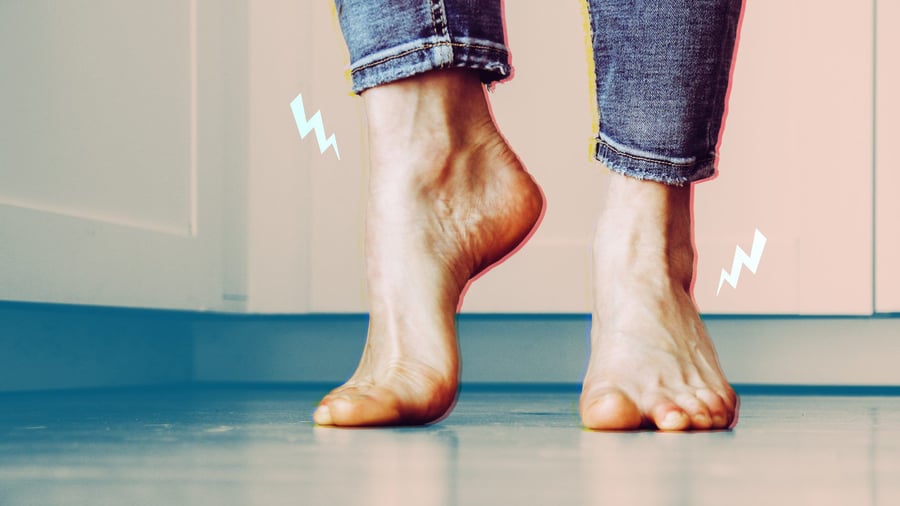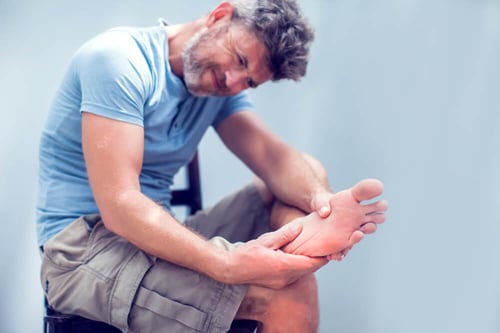
Why is my foot numb? is a question that should be asked of a podiatrist since it may indicate a serious underlying problem.
Numbness, defined as the loss of sensation may occur in one or both feet. It may be a sign of nerve damage, decreased blood flow to the foot, or in some cases both. The clinical term for this condition is peripheral neuropathy.
What is Peripheral Neuropathy
Neuro is derived from the Greek language, meaning nerves, pathy from the Latin word, pathia for suffering or disease. Peripheria is the Latin word for outside or around. Put them all together and peripheral neuropathy is a condition that affects the nerves outside the brain or spinal cord (central nervous system). Because the peripheral nerves are sensory receptors, if you experience neuropathy in your feet, you may feel
- A sensation of tingling or burning that can spread upward to the legs
- A feeling as if you are wearing socks
- Sensitivity to touch
Causes of Peripheral Neuropathy
Diabetic Neuropathy
The first thing your podiatrist may ask is whether you have diabetes. This is because diabetics lack sufficient insulin to metabolize sugar, so they have an excess of sugar in their blood. Unfortunately, even if they are taking medication for diabetes, this excess blood glucose can permanently damage the nerves and cause peripheral neuropathy.
Alcoholic Neuropathy
Your doctor may also ask how much alcohol you drink. Be honest. Excessive alcohol in the blood is thought to have a toxic effect on the peripheral nerves, destroying the myelin that forms a protective sheath around them. The resulting damage to the delicate nerve fibers can cause a disruption of electrical impulses and result in a loss of sensation in the hands and feet.
An excess of alcohol in the blood can lead to a deficiency in B vitamins - thiamine, B12, and folate. This low level, especially of B12 can damage parts of the peripheral nervous system, especially those in the legs, causing a sensation of pins and needles.
Idiopathic Peripheral Neuropathy
Idiopathic is a word used in medicine to indicate that the cause of a disease or condition is unknown. If you are neither an alcoholic nor a diabetic, your peripheral neuropathy will be characterized as idiopathic. Nonetheless, you will suffer the same symptoms.
What Should I Do for My Peripheral Neuropathy?
The most important thing to do if you notice your feet are consistently, or even occasionally numb is to see a podiatrist. The sooner peripheral neuropathy can be diagnosed and treated, the better chance you have of controlling it and preventing further damage to the peripheral nervous system.
The treatment you receive will depend on the type of nerve damage, the location of the damage, and your symptoms. Treatment may restore some of the functions of the nerves as long as the nerve has not died, but the results will be hard to quantify. These may include Vitamin B12 injections, Galvanic Stimulation or Magnetic Therapy.
Galvanic Stimulation is a type of electrotherapy in which a safe low-level electrical current is applied to the skin through electrodes placed on the affected area.
During Magnetic Therapy, magnets are applied to the affected area of the foot in order to balance the electric and magnetic fields surrounding the body in an attempt to put them in better sync with the electromagnetic fields of the earth.
These magnets may be electrically charged or static. Acupuncture needles are believed to work in a similar fashion by clearing the energy channels within the body.
At-home remedies may include the following:
- Maintain a healthy weight.
- Apply lotion to your feet if the skin is dry.
- Visually check for any injuries or infections to your legs or feet that may go unnoticed due to a loss of sensation.
- Take vitamins, especially Vitamin B compounds.
- Exercise regularly since it will improve blood circulation and bring more oxygen to the foot area.
- Moderate your intake of alcohol.
- Keep your toenails trimmed or see your podiatrist for regular maintenance.
If you suspect you are suffering from foot numbness, we encourage you to schedule an appointment at Sweeney Foot & Ankle. Our doctors will assess your situation and determine which treatment is right for you.
Contact us to schedule an appointment today, we look forward to serving you! you!
.






